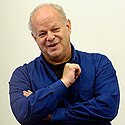Martin Seligman
 | |
| Państwo działania | |
|---|---|
| Data i miejsce urodzenia | 12 sierpnia 1942 Albany |
| profesor nauk psychologicznych | |
| nauczyciel akademicki | |
| uczelnia | Uniwersytet Pensylwanii |

Martin Seligman (ur. 12 sierpnia 1942 w Albany) – amerykański psycholog. Twórca teorii wyuczonej bezradności. Profesor University of Pennsylvania[1]. Twórca pojęcia „psychologia pozytywna”[2][3], dyrektor Positive Psychology Center[4].
Badania
Seligman i Maier prowadzili eksperymenty na zwierzętach. Umieszczali psy w klatce tak, by nie mogły one uniknąć porażenia prądem elektrycznym. Po pewnym czasie i kilkunastu nieskutecznych próbach uniknięcia bólu psy kładły się na podłodze i biernie znosiły cierpienie. Wykazano, że zwierzęta nie podejmują prób odzyskania kontroli nawet wtedy, gdy przeniesiono je do klatki, z której mogły łatwo uciec, przeskakując barierkę. Zachowanie to wynikało z tego, że psy zostały nauczone bierności i bezradności.
Badania i koncepcje Seligmana pozwalają lepiej zrozumieć mechanizm powstawania zaburzeń depresyjnych u ludzi.
Seligman jest zaliczany do grona najbardziej wpływowych psychologów XX wieku.
Publikacje
- Seligman, Martin E. P. (1975). Helplessness: On Depression, Development, and Death. San Francisco: W.H. Freeman. ISBN 0-7167-0752-7 (Paperback reprint edition, W.H. Freeman, 1992, ISBN 0-7167-2328-X)
- Seligman, Martin E. P. (1991). Learned Optimism: How to Change Your Mind and Your Life. New York: Knopf. ISBN 0-671-01911-2 (Paperback reprint edition, Penguin Books, 1998; reissue edition, Free Press, 1998)
- Seligman, Martin E. P. (1993). What You Can Change and What You Can’t: The Complete Guide to Successful Self-Improvement. New York: Knopf. ISBN 0-679-41024-4 (Paperback reprint edition, Ballantine Books, 1995, ISBN 0-449-90971-9)
- Seligman, Martin E. P. (1996). The Optimistic Child: Proven Program to Safeguard Children from Depression & Build Lifelong Resilience. New York: Houghton Mifflin. (Paperback edition, Harper Paperbacks, 1996, ISBN 0-06-097709-4)
- Seligman, Martin E. P. (2002). Authentic Happiness: Using the New Positive Psychology to Realize Your Potential for Lasting Fulfillment. New York: Free Press. ISBN 0-7432-2297-0 (Paperback edition, Free Press, 2004, ISBN 0-7432-2298-9)
- Seligman, Martin E. P. (2004). '„Can Happiness be Taught?”. Daedalus, Spring 2004.
- Peterson, Christopher, & Seligman, Martin E. P. (2004). Character Strengths and Virtues. Oxford: Oxford University Press. ISBN 978-0-19-516701-6.
- Seligman, Martin E. P. (2011). Flourish: A Visionary New Understanding of Happiness and Well-being. New York: Free Press. ISBN 978-1-4391-9075-3.
Przypisy
- ↑ Dr. Martin E.P. Seligman’s Curriculum Vitae. W: University of Pennsylvania, Positive Psychology Center [on-line]. www.ppc.sas.upenn.edu:80. [dostęp 2016-01-11].
- ↑ Martin E. P. Seligman, Mihaly Csikszentmihalyi. Positive Psychology - An Introduction. „American Psychologist”. 55 (1), s. 5-14, 2000. DOI: 10.1037//0003-066X.55.1.5. PMID: 11392865 (ang.).
- ↑ Martin E. P. Seligman, Tracy A. Steen, Nansook Park, Christopher Peterson. Positive Psychology Progress - Empirical Validation of Interventions. „American Psychologist”. 60 (5), s. 410–421, 2005. DOI: 10.1037/0003-066X.60.5.410 (ang.). [dostęp 2016-09-14].
- ↑ University of Pennsylvania, strona internetowa Positive Psychology Center. [dostęp 2015-08-05]. [zarchiwizowane z tego adresu (2015-08-05)].
Bibliografia
- Spencer A. Rathus: Psychologia współczesna, Gdańskie Wydawnictwo Psychologiczne, Gdańsk 2004, s. 622.
Linki zewnętrzne
- Martin Seligman, The new era of positive psychology, TED (konferencja) www.youtube.com
- Jamie Chamberlin, Flourish 2051, Martin E.P. Seligman’s new initiative calls for a global boost in well-being by 2051, Monitor, October 2011, Vol 42, No. 9
- Brad Desmond, Positive Psychology and Politics: Prioritizing Well-Being and PERMA 51, PositivePsychology.com 2016 (2019)
- Lisa Buksbaum, Sir Anthony Seldon interviews Martin Seligman, Positive Psychology News, April 8, 2018; On the occasion of Dr. Seligman receiving an honorary degree from the University of Buckingham (zob. Anthony Seldon)
Media użyte na tej stronie
The flag of Navassa Island is simply the United States flag. It does not have a "local" flag or "unofficial" flag; it is an uninhabited island. The version with a profile view was based on Flags of the World and as a fictional design has no status warranting a place on any Wiki. It was made up by a random person with no connection to the island, it has never flown on the island, and it has never received any sort of recognition or validation by any authority. The person quoted on that page has no authority to bestow a flag, "unofficial" or otherwise, on the island.
Autor: M.s.ananya, Licencja: CC BY-SA 4.0
अमेरिकी मनोवैज्ञानिक, शिक्षक और स्वयं-सहायता पुस्तकों के लेखक
Chief of Staff of the Army, Gen. George W. Casey Jr., talks with Dr. Martin Seligman of the University of Pennsylvania. Thirty-two Army Soldiers and civilians attended a five-day Master Resilience Training course at the university as part of Comprehensive Soldier Fitness (fragment)


